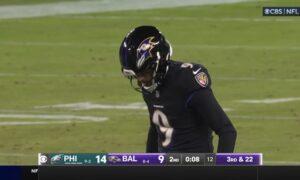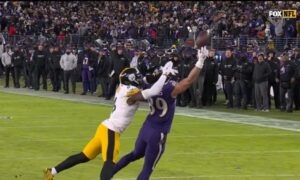The NFL concluded their Owners Meetings yesterday, signaling the end to the first major period of minor tweaking that the league goes through annually in the hopes of dialing in the right language in every rule and of generally improving the game, even if a vocal segment of outside observers tend to disagree.
For example, the competition committee earlier this week tweaked the language that describes the process of a catch, which was a topic brought up to explain why a target aimed for Dez Bryant in the postseason was deemed an incompletion rather than a catch.
Despite the fact that the league, in its own estimation, sought to bring clarity to the rule by eliminating the “football move” verbiage and replacing it with the idea of the receiver becoming a runner, that in no way reshaped its view on whether or not Bryant’s incompletion was a catch.
The competition committee did pass one somewhat significant new measure yesterday, though its game-to-game relevance is likely slight. During the playoffs last season, the New England Patriots took advantage of their ability to declare skill position players ineligible in order to create confusion.
The Baltimore Ravens took umbrage to this tactic, but apparently many teams expressed concern about the Pandora’s Box this strategy could open without establishing guidelines now as to its usage, according to committee co-chair Jeff Fisher. In reality, this tactic was very rarely used, which is why it became so publicized during the postseason.
The committee’s new rule prohibits players wearing eligible numbers who have been declared ineligible from lining up outside the tackle box. You cannot, then, line up your running back in the slot if he is declared ineligible, as the Patriots did. Doing so next season would draw an illegal substitution penalty.
Also yesterday, the league announced that its plans to potentially expand the postseason, which could have taken place as early as this season, had been postponed due to both competitive and scheduling circumstances.
This is, of course, a concern that we first saw expressed by Pittsburgh Steelers president Art Rooney II, who worried that expanding the number of days in which postseason games take place could create unfairly short turnarounds for certain teams who have to play, say, a Saturday afternoon after a Monday night game.
Commissioner Roger Goodell cited specifically the fact that the college football championship takes place on a Monday night as a potential scheduling concern, while maintaining the league’s desire to “make the regular season more important” by allowing more teams to qualify for the postseason, making more teams’ late-season games relevant in terms of a potential playoff bid.
Goodell said that a Thursday night game could be a possibility, though there would also be potential scheduling conflicts involved with choosing that date as well. Ultimately, it is expected that the league will eventually expand the playoffs to at least 14 teams, but it appears that the discussion will have to wait at least one more offseason.








